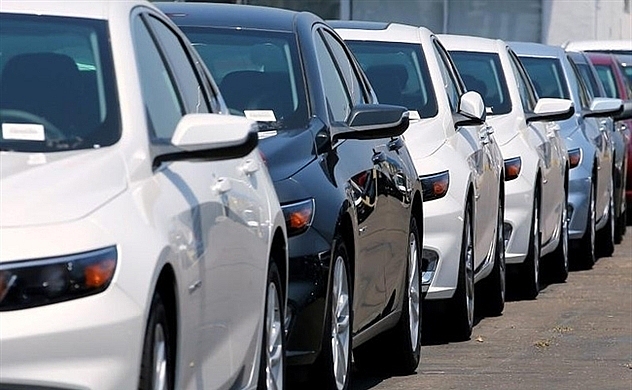Discount paradise for auto buyers
 |
| Discount paradise for auto buyers, illustration photo |
In Resolution 84/NQ-CP released over a week ago on tasks and solutions to remove enterprises’ difficulties, boost public investment, and ensure social order, Prime Minister Nguyen Xuan Phuc underlined a 50 per cent cut in registration fees for locally-assembled cars. With such a fresh move, enterprises with many domestic and assembled models such as THACO, Thanh Cong, VinFast, Toyota, and Mercedes-Benz will benefit as customers move from completely-built-up (CBU) units to localised models through the fee cut, valid until the end of 2020, and not applied for imported vehicles.
The registration fees makes up about 12 per cent of the vehicle cost, thus the cut will make for a sizeable attraction for domestically-produced vehicles by allowing customers to save thousands of US dollars.
A series of car dealers hailed the move, saying it could reignite the market after slumping demand due to the global pandemic. According to the Vietnam Automobile Manufacturers Association (VAMA), car sales have hit a five-year low, dropping 36 per cent on-year to about 61,000 units in the first four months of this year. The five-month figure is set to be made available next week.
Nguyen Anh Trung, an automobile salesperson at Hanoi’s Le Van Luong street, said after the social distancing order was lifted, the market for locally-made automobiles thawed in May, some brands and dealers began to offer discounts of VND50-100 million ($2,200-4,340) depending on the model, to attract new customers.
VinFast Trading and Services Co., Ltd, a subsidiary of Vingroup – the largest multi-sectoral private group in Vietnam, has just launched a special promotion programme for zero VND registration fee and a 5-year warranty for the Lux SA2.0 and Lux A2.0 models. Accordingly, VinFast will support 100 per cent of the registration fee for customers who buy either of the two cars until the end of the year. These costs will be deducted directly from the car price.
However, Nguyen Manh Cuong, a car salesman based in Hanoi’s Long Bien district, said that Resolution 84 failed to specify the exact time to start applying the fee reduction. Thus, for other brands that do not have the support of the change, customers will have to wait for more information.
The government-issued resolution for locally-manufactured vehicles is indeed only a guideline, with specific implementation guidance still to be unveiled by the Ministry of Finance.
Imported Honda CR-V products, the bestseller from Japanese giant Honda, will lose many of its advantages and even have to join a price war with domestically-assembled vehicles. CR-Vs are now priced between VND983 million-1.09 billion ($42,700-47,500), and customers in Hanoi have to pay VND118-130 million ($5,100-5,700) registration fee.
Meanwhile, customers only need to pay about VND60 million ($2,600) for a locally-built rival Mazda CX-5 or a Hyundai.
To attract more buyers, import groups have nevertheless released their own packages. From the beginning of April a series of imported car brand companies announced a sharp discount. Volkswagen Tiguan and Passat model cuts were being offered at around VND200 million ($8,700), the Subaru Forester was seeing discounts by agents in some regions by VND165-175 million ($7,200-$7,600), Honda CR-V buyers could grab a discount of 150 million ($3,450), the Chevrolet Colorado was being discounted by VND 92-154 million ($4,000-$6,700), and the Nissan Terra recorded price reductions by around 120 million ($5,200).
Vietnam’s car market grew at a moderate pace in 2019, with 322,300 units sold, up 12 per cent against last year, according to a VAMA report released in January this year.
Taking into account the number of car sales from non-VAMA members, a total of 399,900 units were sold last year, the record figure number for Vietnam’s car market to date.
Meanwhile Vietnam Customs said the number of imported CBU cars last month reached about 5,000 units, up 5.7 per cent on-month.
The car import market to Vietnam still mainly involves Thailand, Indonesia, China, Japan, and Germany. By the end of May, Vietnam imported 37,000 cars worth $800 million, down by nearly 27,000 units on-year.
What the stars mean:
★ Poor ★ ★ Promising ★★★ Good ★★★★ Very good ★★★★★ Exceptional
Related Contents
Latest News
More News
- Vietnam financial markets on the rise amid tailwinds (February 11, 2026 | 11:41)
- New tax incentives to benefit startups and SMEs (February 09, 2026 | 17:27)
- VIFC launches aviation finance hub to tap regional market growth (February 06, 2026 | 13:27)
- Vietnam records solid FDI performance in January (February 05, 2026 | 17:11)
- Manufacturing growth remains solid in early 2026 (February 02, 2026 | 15:28)
- EU and Vietnam elevate relations to a comprehensive strategic partnership (January 29, 2026 | 15:22)
- Vietnam to lead trade growth in ASEAN (January 29, 2026 | 15:08)
- Japanese business outlook in Vietnam turns more optimistic (January 28, 2026 | 09:54)
- Foreign leaders extend congratulations to Party General Secretary To Lam (January 25, 2026 | 10:01)
- 14th National Party Congress wraps up with success (January 25, 2026 | 09:49)

 Tag:
Tag:



















 Mobile Version
Mobile Version